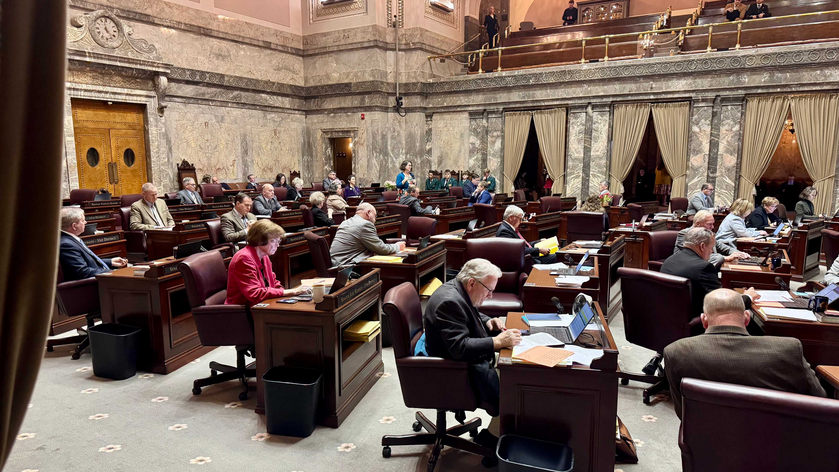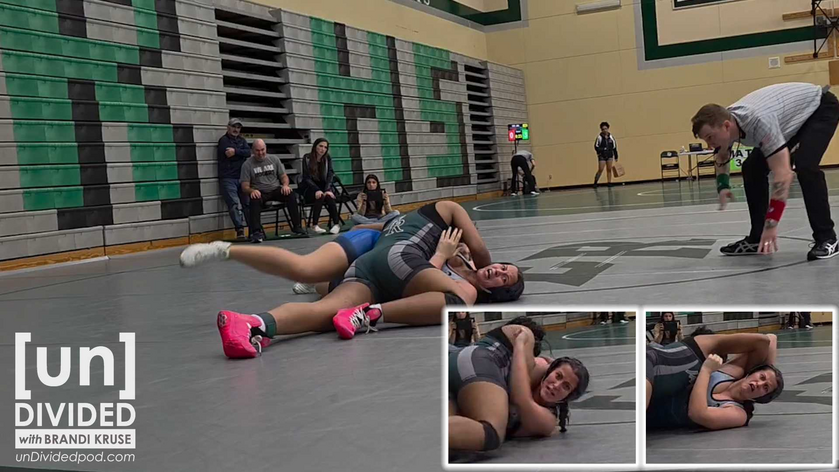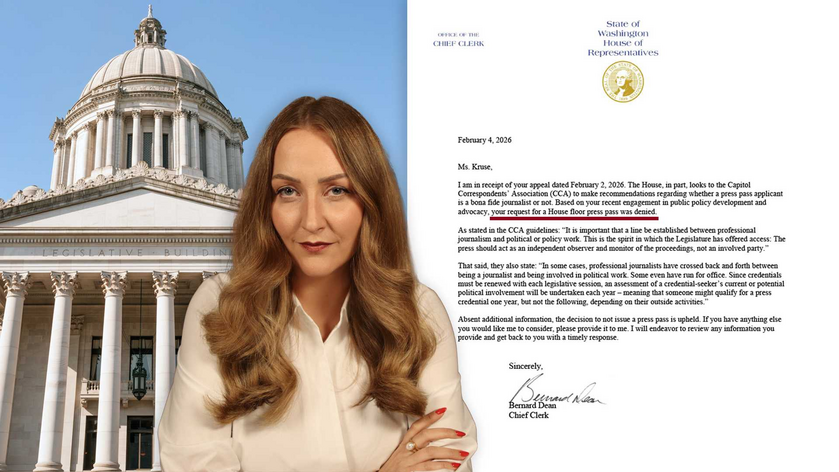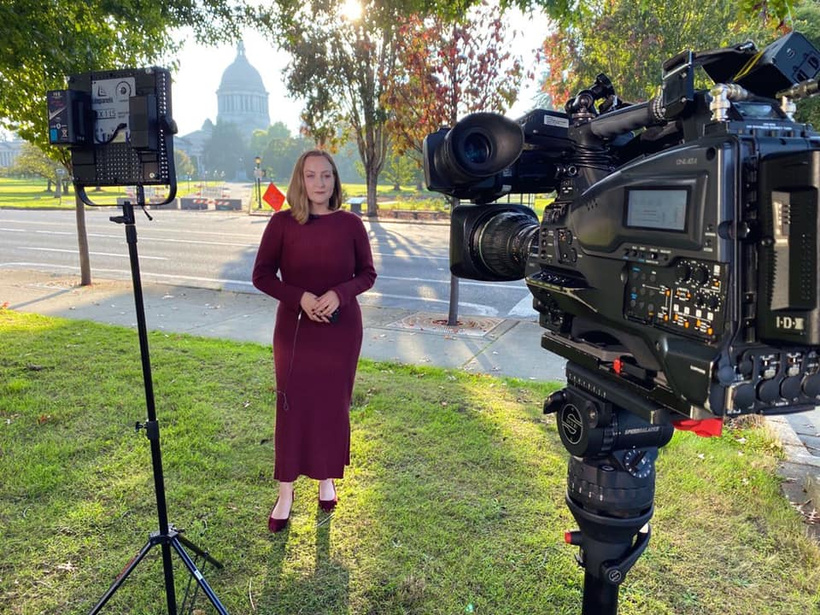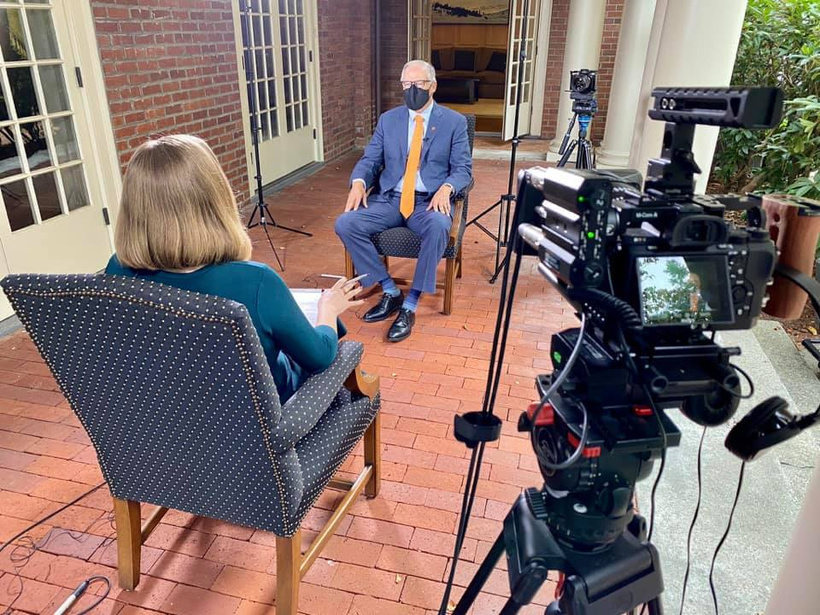For the first time in at least 50 years, politicians are directly in charge of controlling press access to the state legislature in Olympia.
It’s going about as well as you’d think.
On Wednesday afternoon, the State Senate voted to ban credentialed reporters from the wings of the chamber. The restriction is a major blow to reporters who cover the statehouse, as the wings are a common place to interview legislators, gather information on upcoming votes, and stay up-to-the-minute on fast-paced floor action.
So how is it that politicians came to have power over the movements of Washington state’s press corps? Well, that’s the worst part. The media willingly handed it over.
How we got here
You are going to read a lot about this in the coming days. There’s no doubt legacy media will blame me personally, at least in part. But they set the stage for what just happened – and ignored multiple warnings that would have prevented it.
Up until earlier this month, media credentials and access were governed by the Capitol Correspondents Association (CCA). The small group of statehouse reporters were long tasked with determining rules for press access – who gets a pass, where they can go with that pass, and the code of conduct for keeping it.
The system was imperfect, to say the least.
Much like the better-known White House Correspondents Association, Olympia’s association had the power to pick winners and losers. As new media platforms and independent outlets started asking for credentials, the legacy reporters who controlled them became territorial (I’d liken it to the famous “you can’t sit with us” line from the movie Mean Girls).
I first started sounding alarms about this issue not long after I left mainstream news to launch the unDivided Podcast. In February 2023, I wrote a story about how fellow independent journalist Jonathan Choe was being excluded from press conferences. In one case, King County employees physically blocked him from attending a media tour of a taxpayer-funded homelessness complex, despite Choe being one of the only reporters who'd been covering the project regularly.
At the time, I questioned why organizations in the state that exist to defend press freedom and advocate for open government were not coming to Choe’s defense.
The Washington Coalition for Open Government, an organization I've routinely supported in its public records fights, stayed silent. As did every mainstream journalist.
Even when King County Executive Dow Constantine declared on camera that Choe was “not actually a journalist,” First Amendment advocates said nothing.
I was stunned, and issued this warning:
“Failure to defend Choe gives Constantine a free pass for his behavior. Even worse, it emboldens other politicians who hope to evade hard questions by engaging in personal attacks.”
In short: United we stand, divided we fall.
Rather than listen, Washington state’s legacy media opted to learn the hard way.
Why the Capital Correspondents Association gave up control
In the lead up to the 2025 legislative session, there were whispers in political and media circles that the CCA would be strict with full-time press passes.
Jerry Cornfield, a statehouse reporter for the Washington State Standard in charge of issuing so-called hard passes, determined they would only be issued to reporters who were covering Olympia full time. Others would be given day passes on a case-by-case basis and would need to request them in advance (difficult considering newsroom assignments are often handed out the same day).
On February 4, I requested a credential and was denied.
I learned other non-traditional and new media reporters had also been denied or had their requests go unanswered. Among them were Jonathan Choe and several reporters for The Center Square, an online news outlet and wire service covering statehouses across the country.
When I asked Cornfield why my request was denied, he cited my “active involvement in the political process,” quoting this excerpt from the Capital Press Corps guidance:
Credentials shall not be issued to anyone who is or may become engaged in political campaigns or the development of public policy, including holding positions or doing any work for an elected or appointed government official, political party organization, campaign, political consultancy, political action committee or other such organization, regardless of whether such work is paid or unpaid.
Certainly, I have used my platforms to advocate for political candidates and policies, much like a newspaper editorial board. But why should that matter?
The form of reporting I’m engaged in is far closer to what our Founding Fathers sought to protect than today’s traditional media.
In the early days of the fight for independence, pamphleteers like Thomas Paine circulated their writings to gain support for the very ideas that established our nation and its founding documents. They fought against the monarchy and for a representative government. They never hid their opinions or biases. Our country wouldn’t be what it is today without them.
In many ways, today’s growth of new media and independent voices better captures the spirit of our nation’s early press – and better illustrates the importance of the First Amendment. After all, the free speech that most needs protection is the speech that those in power would be most eager to silence.
Federal courts have also repeatedly affirmed for almost a half century that press credentials cannot be denied because a reporter “take[s] sides, especially in political contests,” or “participate[d] in political party events.”
That's why in mid-February, myself, along with a group of new media and independent reporters who’d been denied press passes, retained the services of Seattle law firm Davis Wright Tremaine – which has done important work defending press access around the nation and holding the government accountable for lapses in transparency.
The hope was to avoid a drawn-out legal battle – or, honestly, a legal battle at all.
Our attorney drafted a letter to the Capitol Correspondents Association, urging it to issue passes.
…As detailed below, your refusal to timely issue full press credentials to the reporters violates their First Amendment rights and undermines the rights of the free press and all other journalists in Washington State. We therefore demand that you confirm they will be issued full passes immediately and that you will not impede their access to such credentials in the future, or in the alternative, that you provide your availability for a meeting to discuss this issue before we initiate litigation.
It didn’t take long to see progress (a strongly worded letter from a reputable attorney can have that effect). Our attorney met a few days later with Cornfield and CCA Vice President Jeanie Lindsay, who works as a reporter for KUOW. Within hours, the last remaining uncredentialed reporter at The Center Square was given a hard pass.
But that’s where things seemed to stall.
When it came to passes for me and Jonathan Choe, the CCA wouldn’t budge. And their rationale was all over the place.
While their denial for me previously focused on my political advocacy, they now brought up social media posts where I stated, "I am not a journalist."
“We take her at her word and cannot recommend she be awarded a hard pass,” they wrote.
That is, of course, obtuse. There are many layers of the media. I believe it's important not to leave room for confusion about what I do. I am engaged in reporting and opinion, not journalism. But one is not more worthy of First Amendment protection than the other.
As for Choe, the CCA cited his work for Discovery Institute, “which is not a news organization,” they wrote. After our attorney pointed out that Choe is also a reporter for a number of other national and local news organizations, they then went after his perceived lack of decorum, citing an incident where he defended himself against an attack while reporting in the field.
…we are deeply concerned about Mr. Choe's actions in April 2024 when he was accused of assaulting a woman while he was purportedly covering an event. There is a police report and public reporting of the incident. That alone seems to be disqualifying behavior for us to recommend he receive any kind of credential.”
An odd rationale considering the uptick in assaults on the media. Are we kicked out of the club if we defend ourselves?
On March 7, Davis Wright Tremaine issued a final demand of the CCA. It just so happened that I was in Olympia covering the legislature that day (where I had to be invited as a guest by Republican lawmakers in order to do my job). I was hopeful I could pick up a press pass that day and be done with it.
Wishful thinking.
Rather than relent, things took an unexpected turn. Fearing a lawsuit, Cornfield and the CCA relinquished their control over press passes entirely – handing the power over to the House and the Senate.
You read that correctly. The Capitol Correspondents Association was so opposed to giving me a press pass, they abdicated more than 50 years of control and handed it off to the very politicians we’re supposed to be holding accountable.
Absolutely stunning.
Cable news was indignant when President Donald Trump’s Press Secretary seized control of access to daily White House briefings – and rightfully so. But is willingly handing over control any better?
State Senate moves quickly to pass new rules
As soon as the CCA dissolved, House and Senate leaders started working on stopgap policies to govern media access.
While the House has yet to make formal recommendations, news broke Wednesday that the Senate would be voting on new rules to dictate where members of the media could report from.
A hurried email alert went out from the Washington Newspaper Publishers Association.
Forwarding an important and urgent message from the Washington Coalition for Open Government. Forwarded below is a message from Austin Jenkins who says there is formal legislation the senate is expected to take up TODAY at 12:30 pm that would formally kick reporters out of the Senate wings. As you know, reporters engage with senators there and get vital access and information. IF YOU HAVE JUST TWO PRECIOUS MINUTES TO ACT, PLEASE CONTACT YOUR LEGISLATOR IMMEDIATELY to let them know this is an unacceptable limiting of press access, in a state that purports to value the role of the Free Press.
Austin Jenkins is a longtime TVW host who now works for Pluribus News.
Sounds like the WA Senate will vote today to kick reporters out of the Senate wings. As I understand it this came about because the Capitol Correspondents Association was under threat of litigation from the likes of Brandi Kruse and Jonathan Choe and thus handed credentialing of reporters back to the House and Senate. Rumor is Lt. Gov Heck was none too pleased. Needless to say, the wings is where reporters are able to engage with members and get vital access and information. If this passes, it will be a huge restriction on press and a major departure from historical norms.
It's always nice for your name to come after “the likes of.”
The rule change passed Wednesday afternoon on a voice vote. Senate Majority Leader Jamie Pedersen (D-Seattle) explained the change in an email published by the Lynnwood Times.
The Lieutenant Governor, who is responsible under the Senate Rules for enforcing the rules and maintaining decorum in the chamber, established a process by which self-identifying members of the press can fill out an online form agreement to receive a press pass. The agreement requires the individual to attest to being a member of the press, provide contact information for themself and their organization, and agree to abide by Senate rules of decorum.
The Senate also passed a rule Wednesday allowing press access to the Senate gallery; first-come, first-served access to the Senate floor’s press table; and access to the Senate wings upon invitation from a senator or staff. This is a temporary measure for the remainder of the 2025 session. The Legislature will work on a more permanent plan during interim.
What’s interesting about the change is that it actually expands existing access for independent journalists by at least allowing us to get a press credential. Sure, we can’t be in the wings reporting – but the CCA wasn’t letting us do that anyway. The only people who saw their access further restricted because of the new rule? The legacy media outlets that were trying to play gatekeeper.
In their effort to shut out independent media, they ended up hurting themselves and – in turn – their readers and viewers.
This is the exact sort of scenario I’ve spent the past three years warning about.
Remember? United we stand, divided we fall.
Those who claim to care the most about government transparency and accountability created this mess by picking and choosing which battles they fought – ignoring attacks on journalists and media outlets who they deemed as less legitimate or whose political opinions they disagreed with.
In doing so, they weakened everyone’s First Amendment protections.
What happens from here?
While the new rule passed Wednesday doesn’t further restrict my access in Olympia, it remains incredibly problematic. Under the rule, I will still need to ask a favor of a state legislator if I want to report from the wings.
Reporters shouldn’t have to be invited or chaperoned by lawmakers in order to report on those very lawmakers. What happens when a reporter is critical of the lawmakers who have been giving them access? Will they constantly be worried that the access will be taken away?
After Wednesday’s vote, I was made aware that Senate Minority Leader John Braun (R-Centralia) sent a formal request to the Secretary of the Senate to ensure that I have access to report from the Republican wings in perpetuity. I didn’t ask Senator Braun to write the letter, nor did I know of it in advance. I have, however, spoken with Senator Braun and other lawmakers in recent weeks about my concerns over press access. Senator Braun sent similar letters on behalf of other non-traditional reporters, as well as a blanket letter to cover any established members of the media. I am grateful that they are taking steps to help provide access while we determine next steps.

In speaking with several members of the Senate Republican Caucus who voted in favor of the rule change, they say they saw it as a better alternative for independent media given that lawmakers could help facilitate access to the wings. Certainly, there’s an advantage for them if independent outlets, which tend to lean conservative, have equal access to legacy media, which has long skewed to the left.
As for the Democratic side, I am highly skeptical of their motives.
During debate, Senator Manka Dhingra (D-Redmond) falsely claimed the new rule "does not change or limit any of the access." It does. Senator Lisa Wellman (D-Mercer Island) suggested it was important to "preserve the publication of truth and verified facts" after going on a rant about people who simply report on their own YouTube channels. She lamented that today's new media is not the "Walter Cronkite" that she grew up with.
I have little doubt that the rule change was, at least in part, an effort from Democrats to keep conservative media out of the wings on their side and at arm's length. If that's not their intention, they should extend the same courtesy Senator Braun and the Republican caucus did after Wednesday's vote. Will they? Highly unlikely.
I remain very concerned that restrictions will only expand between this session and next session as they work on permanent rules.
Regardless of your politics, we should be able to agree that the more people who can do the hard work of holding our elected officials accountable, the better.
The only way to avoid further restrictions across the board is for old media and new media to present a united front. We’re all in the business of keeping people informed. It’s time to set egos aside and put our duty to the public first.
Ultimately, the question is simple: Are you on the side trying to limit access, or the side fighting to expand it?
Correction: A previous version of this story stated the rule change passed on a 40-9 vote. The rule change was passed on a voice vote.

